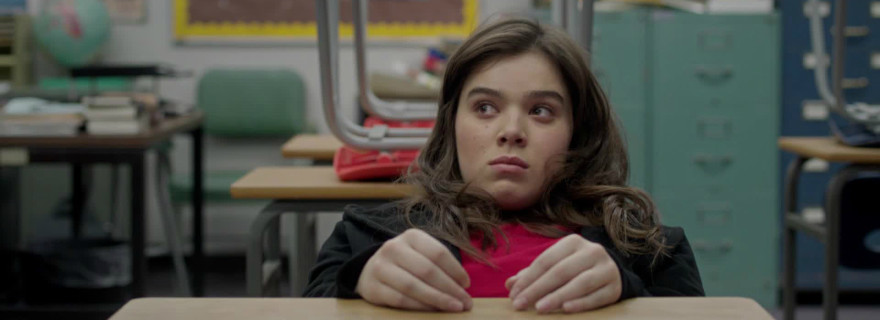'The Edge of Seventeen'
Movie Rating:
3.5
Most teen dramas and comedies aren’t really about what it’s like to be a teenager. They take place in a magical land where every teen resembles a twenty-something model/actress, a place where no social hierarchy can’t be overcome, where parties are of Roman scale and debauchery, and where awkwardness can be cured simply by removing glasses in a makeover montage. Thankfully, ‘The Edge of Seventeen’ isn’t one of those movies.
This is a painfully honest, hilariously uncomfortable, and hopelessly awkward peek into the mind of a teenage girl that should bring about waves of the most embarrassing recognition from any viewer. First-time director Kelly Fremon Craig proves to have such a distinctly honest comedic voice that this is hopefully but the start of a long and satisfying career.
Hailee Steinfeld stars as Nadine, a renegade motormouth who is completely dejected from everyone in her high school and home life. It seems like most of that might be her own fault, but she’s too busy hating everything to notice. Her only friend is Krista (Haley Lu Richardson), and their goofball banter is the only thing that keeps her sane. Unfortunately, Krista falls for Nadine’s jerk of a brother (Blake Jenner), which sends Nadine into a spiral. Her mother (Kyra Sedgwick) is no help since the woman is even more of an emotional adolescent than her daughter. The only support Nadine has is a burned-out English teacher played by Woody Harrelson. Even he is only a support figure mostly because he’ll sit patiently through the girl’s endless rants and then toss out a dismissively sarcastic insult at the end. For Nadine, this is going to be one of those life-changing times when you learn to cope with teenhood by realizing that grown-ups are confused messes as well.
The movie lives and dies on the shoulders of its protagonist. Thankfully, Nadine is a pretty great one. She’s a self-made outsider. She doesn’t fit into any of the obvious high school cliques and she’s a little too intelligent for her own good. However, her embittered verbal lashes against the world are so clearly rooted in self-loathing and neuroses that she’s her own worst enemy. Her barbs and rants are reflections of her own broken self, even if she doesn’t realize it and her attempts to connect with anyone else are always rooted in self-destructive impulses. As written by Craig and played by Steinfeld, Nadine is a compulsively watchable character – a bursting, bouncing ball of energy ricocheting off of everything and everyone around her. Steinfeld commands the screen. She’s charming, hilarious, damaged and real, spitting out machine-gun dialogue that shouldn’t sound like human speech with ease and emotion. It’s a brilliant performance that holds everything together.
The case has other bright spots as well. Woody Harrelson’s human sigh of a battered teacher is an equally hysterical presence whose completely opposite energy level matches perfectly with Nadine in their verbal sparring matches. Kyra Sedgwick is just as good as her defeated mother struggling to keep anything resembling a life going, somehow finding humor in all the pain she has to show.
Other than that, the characters feel a little thin. Nadine’s seemingly perfect brother and friend feel like pale versions of similar characters in ‘Election’ without any of the real world awkwardness or satirical bite. Their relationship is inevitable as are their eventual confessionals. They feel like necessary script evils for Craig to make her points in the screenplay and sadly never quite add up the same way. The less said about the geeky boy who has a hopeless crush on Nadine the better. Their relationship is sweet, but it feels like it should part of a more obvious teen movie than this one.
Kelly Fremon Craig shows off her filmmaking chops well in ‘The Edge of Seventeen’ and has created one hell of a central character. Unfortunately, her movie doesn’t quite have the courage of its convictions, setting up a messy reality and then wrapping it up with the familiar comforts of fiction. James L. Brooks produced the film, and its back half speaks to his cuddly crowd-pleasing impulses. It might be too easy to lay the blame on Brooks, but the movie sure starts to feel like one of his productions after a while. That’s not a horrible thing. In fact, it will likely earn the film a wider audience and attention this year. It’s just a shame that it results in sacrificing what could have been a more complex and interesting character study with cult potential.
They say people like happy endings. I’m just not sure why.



